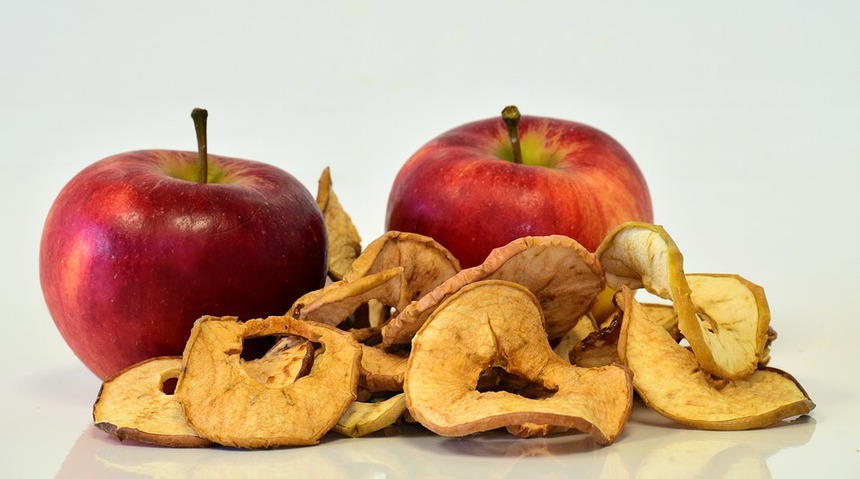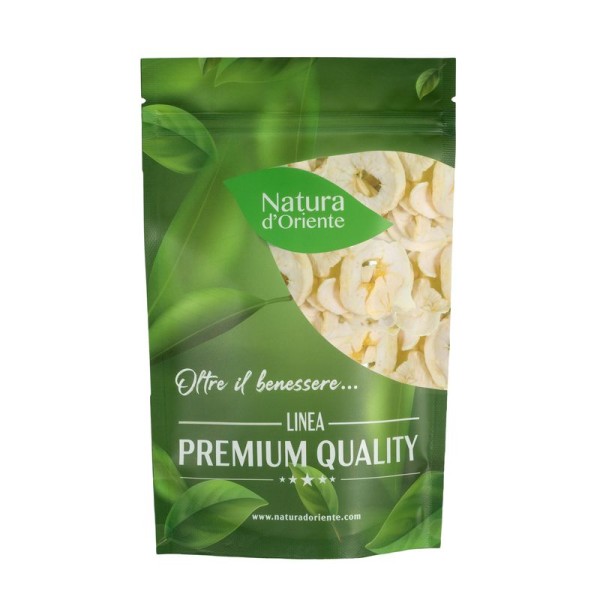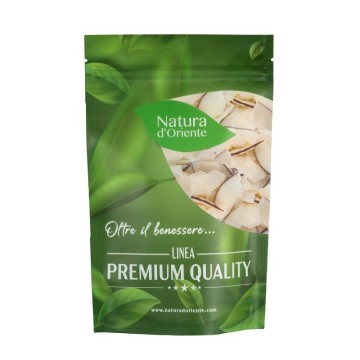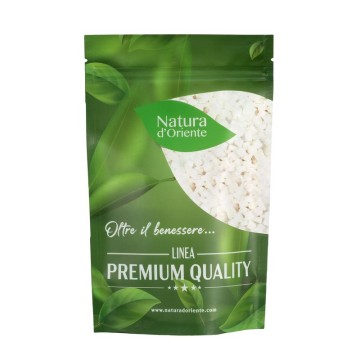Natural dehydrated disk apple
Who hasn't heard the well-known proverb "an apple a day keeps the doctor away"? Known for millennia for its healthy properties, apples give us valuable nutritional values.
Even in the version of the dried discs, the apple allows you to obtain benefits in terms of well-being.
Dried apple: properties and benefits
In the face of so many properties that lead to the well-being of the organism, the apple gives us few calories and contraindications. A precious fruit, as we have said, an ally of health. The beneficial properties of apples are related to the active ingredients contained.
The apple contains malic acid, which gives the fruit a slightly tart flavor, and which can facilitate the digestion of the meal.
Each apple is made up of simple sugars such as fructose, sucrose, and glucose. Despite this, they have a low glycemic index, due to the good fiber content.
One of the advantages of dried apples is that it contains a 'high amount of soluble and insoluble fiber , which we know are important for our body. Taken in the right quantities, the fibers lead to the well-being of digestion, with less time for intestinal transit, a sense of satiety, a reduction in cholesterol, blood sugar and insulin after lunch. That's why it can be consumed in moderation, even by people with diabetes.
Soluble fiber is responsible for controlling blood sugar levels, while insoluble fiber keeps your intestines clean.
Apples have therefore always been associated with a balanced diet.
Like other fruits, apples contain a fair amount of vitamins and minerals.
Various vitamins are concentrated in the pulp of apples and dehydrated apples, in particular from the B1, B2 and C group .
dried apples contain pantothenic acid (vitamin B5) and pyridoxine (vitamin B6). Vitamins that promote energy metabolism , improve hormonal balance and nourish the brain - at the level of neurotransmitters.
In addition to the B vitamins, magnesium and phosphorus and other elements present in dehydrated apples have a calming effect on the nerves.
Mineral salts are also present, especially potassium, magnesium, calcium, iron and phosphorus.
Whether fresh or like dehydrated apples, these fruits are a rich source of antioxidants, especially polyphenols. These are substances that help fight cell damage caused by free radicals (molecules and atoms emitted by air pollutants, pesticides, alcohol and fried foods).
Dried apples increase the body's supply of minerals, which can contribute to overall health and well-being. They contain potassium, which is essential for maintaining the functions of the brain and nervous system; sodium to maintain water balance in the body, blood volume and blood pressure; iron that helps create red blood cells, which then carry oxygen in the blood to various parts of your body.
At the level of dental hygiene, apples have excellent whitening properties: chewed for a long time can help to clean the teeth after a meal. The acids present in dried apples kill bacteria during chewing and clean teeth and gums.
Origins and History of cultivation
Cultivated already in the Neolithic period, the apple tree is a plant native to Central Asia. The tree and its fruit spread through the Middle East, first along the Nile valley in Egypt and later in the Greek territory.
The conquests of the Roman Empire in those territories spread the apple tree throughout continental Europe, and even in the Middle Ages, cultivation continued thanks to farmers and monks from all over Europe. The many qualities of apples increased, which would have given rise to a great selection of varieties, in the Renaissance period.
After the great explorations from the sixteenth to the eighteenth century, the cultivation of the apple tree spread to North America, Australia and New Zealand by the settlers. Plants imported from Europe led to other crop developments.
Today the apple tree is the most cultivated tree in the world, due to the goodness of the fruits that are easily transportable and well preserved.
On a symbolic level, we know very well that the apple is a fruit known since ancient times with many legends and tales, in addition to the biblical tradition for which it was precisely the apple that made Adam and Eve fall into temptation. Over the centuries the apple has become a symbol of love and fertility, represented next to the Madonna and Child.
A legendary apple is that of the Swiss hero William Tell, who thehit with an arrow, on the head of the son, managing to save his life. The apple fruit is also present in numerous fairy tales, such as in Snow White by the Brothers Grimm.
The apple that fell on Isaac Newton's head is also famous in the scientific field: this is how the scientist guessed the law of universal gravitation!
In modern symbology we know both the Big Apple, the nickname of New York, and the famous apple of the computer company Apple; or Apple Corps, a record company founded by the Beatles.

Plant and Fruit
The Apple plant is Malus domestica, a domestic tree of the Rosaceae family, native to Asia and spread all over the world.
The apple is a fleshy fruit, which when harvested is rounded, about 5-10 cm in diameter and red, green or yellow in color. Apples vary in size, shape and acidity depending on the variety.
The apple tree thrives in areas with a distinct winter period, and to the north, cultivation is limited by low winter temperatures and a short growing season.
The land in which apple trees grow must be well drained, preferably grown on hills, which allow colder, heavier air to drain into the valley below.
Nutritional values of dehydrated apple
The dehydrated apple discs , can make different nutrients bio-available to our body, and with a low calorie content compared to other types of fruit - 287 kcal per 100 grams. This dehydrated fruit contains little fat (0.7%), provides minerals, vitamins, fiber (about 8 g / 100 g), proteins (1.5 g / 100 g).
Even in the dried version in discs, minerals are available in the apple such as potassium (about 400 mg / 100g), calcium (about 20 mg / 100 g), phosphorus (about 35 mg / 100 g), sodium (about 80 mg / 100 mg) and iron (about 1.5 mg / 100 g).
The dietary values of natural dried apples show excellent contents of vitamin C (about 4 mg / 100 g) and vitamin K (about 3 µg), and Vitamin B-3 (about 0.90 mg).
It also contains, per 100 grams, riboflavin (vitamin B - about 0.15 mg), pantothenic acid, and substances such as Vitamin E (alpha-tocopherol - about 0.50 mg), lutein and zeaxanthin (15 µg) .
How to consume natural dehydrated apple in disk
Dried apples are naturally sweet, making them a tasty alternative for a wellness snack . In their version of discs (slices), these apples are like fruit crisps in snack portions, with a good hunger breaker effect .
However they can also be used for various sweet preparations, for decorations of cakes, ice creams, cupcakes, muffins and other pastry specialties.
The dehydrated apple disc can be added to make yogurt, smoothies, dried fruit and cereal mixes tasty, as well as to flavor tea and infusions.
The apple discs can also become a decoration for natural drinks or non-alcoholic drinks.
Dried apple: side effects and contraindications
Apples are generally safe as food, with little or no side effects.
In any case, apples are one of the fruits that trigger allergic reactions in some people, along with peaches and kiwis. For this reason, even in the dehydrated version, those who are allergic to apples should avoid consuming them.









 No reward points for this product.
No reward points for this product.


















